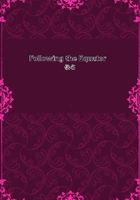
第160章
The Autocrat of Russia possesses more power than any other man in the earth; but he cannot stop a sneeze.
--Pudd'nhead Wilson's New Calendar.
WAUGANIUI, December 3. A pleasant trip, yesterday, per Ballarat Fly.
Four hours. I do not know the distance, but it must have been well along toward fifty miles. The Fly could have spun it out to eight hours and not discommoded me; for where there is comfort, and no need for hurry, speed is of no value--at least to me; and nothing that goes on wheels can be more comfortable, more satisfactory, than the New Zealand trains.
Outside of America there are no cars that are so rationally devised.
When you add the constant presence of charming scenery and the nearly constant absence of dust--well, if one is not content then, he ought to get out and walk. That would change his spirit, perhaps? I think so.
At the end of an hour you would find him waiting humbly beside the track, and glad to be taken aboard again.
Much horseback riding, in and around this town; many comely girls in cool and pretty summer gowns; much Salvation Army; lots of Maoris; the faces and bodies of some of the old ones very tastefully frescoed. Maori Council House over the river-large, strong, carpeted from end to end with matting, and decorated with elaborate wood carvings, artistically executed. The Maoris were very polite.
I was assured by a member of the House of Representatives that the native race is not decreasing, but actually increasing slightly. It is another evidence that they are a superior breed of savages. I do not call to mind any savage race that built such good houses, or such strong and ingenious and scientific fortresses, or gave so much attention to agriculture, or had military arts and devices which so nearly approached the white man's. These, taken together with their high abilities in boat-building, and their tastes and capacities in the ornamental arts modify their savagery to a semi-civilization--or at least to, a quarter-civilization.
It is a compliment to them that the British did not exterminate them, as they did the Australians and the Tasmanians, but were content with subduing them, and showed no desire to go further. And it is another compliment to them that the British did not take the whole of their choicest lands, but left them a considerable part, and then went further and protected them from the rapacities of landsharks--a protection which the New Zealand Government still extends to them. And it is still another compliment to the Maoris that the Government allows native representation--in both the legislature and the cabinet, and gives both sexes the vote. And in doing these things the Government also compliments itself; it has not been the custom of the world for conquerors to act in this large spirit toward the conquered.
The highest class white men Who lived among the Maoris in the earliest time had a high opinion of them and a strong affection for them. Among the whites of this sort was the author of "Old New Zealand;" and Dr.
Campbell of Auckland was another. Dr. Campbell was a close friend of several chiefs, and has many pleasant things to say of their fidelity, their magnanimity, and their generosity. Also of their quaint notions about the white man's queer civilization, and their equally quaint comments upon it. One of them thought the missionary had got everything wrong end first and upside down. "Why, he wants us to stop worshiping and supplicating the evil gods, and go to worshiping and supplicating the Good One! There is no sense in that. A good god is not going to do us any harm."The Maoris had the tabu; and had it on a Polynesian scale of comprehensiveness and elaboration. Some of its features could have been importations from India and Judea. Neither the Maori nor the Hindoo of common degree could cook by a fire that a person of higher caste had used, nor could the high Maori or high Hindoo employ fire that had served a man of low grade; if a low-grade Maori or Hindoo drank from a vessel belonging to a high-grade man, the vessel was defiled, and had to be destroyed. There were other resemblances between Maori tabu and Hindoo caste-custom.